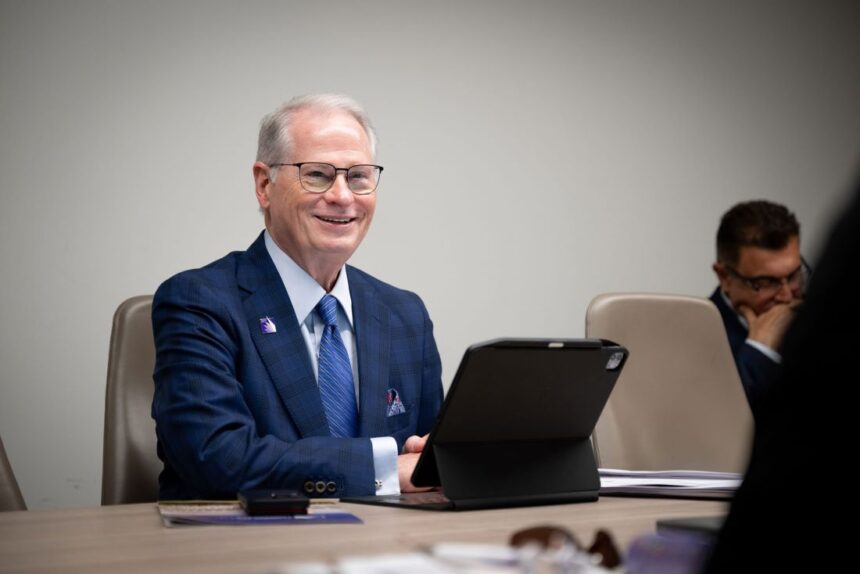Florida Polytechnic University is entering a new era under Dr. G. Devin Stephenson as president, with ambitious goals to double student enrollment and add science- and medicine-focused programs. Stephenson hopes his leadership can guide Florida Poly to greatness!
Stephenson’s vision for Florida Poly is achieving an annual enrollment growth rate of 10% and moving toward 5,000 students, building upon his experience at his former institution and drawing inspiration from their success in consistently increasing enrollment numbers. Additionally, new programs should help draw diverse student bodies and enhance Florida Poly’s standing within higher education circles.
| Strategy | Description | Challenges |
|---|---|---|
| Enrollment Doubling Strategy (EDS) | Increase enrollment by 10% annually until reaching 5,000 students through targeted recruitment. |
|
| Economic Impact Enhancement | Boost Florida Poly’s impact on the local and state economy through strategic partnerships. |
|
| Academic Program Expansion | Add new programs in science and medicine to attract diverse students and meet workforce needs. |
|
| Infrastructure Expansion | Build new facilities, including residence halls, to support enrollment growth. |
|
| Community and Industry Partnerships | Develop partnerships with businesses to enhance student experiences and opportunities. |
|
Florida Poly is making waves this year with record enrollment numbers and new facilities, and the community eagerly anticipates seeing how Stephenson leads Florida Poly to greater expansion and influence within the educational landscape.
Florida Poly’s Strategic Vision for its Growth
Florida Polytechnic University’s newly appointed president plans to implement strategies designed to substantially increase enrollment and enhance economic impact – positioning Florida Poly as a leader in higher education innovation and advancement.
Enrollment Doubling Strategy (EDS)
Florida Poly’s goal for enrollment growth is an annual 10% increment until the student body hits 5,000 students, using targeted recruitment approaches such as:
- Expanding Outreach: Increased visibility at high schools and community colleges.
- Diverse Programs: New offerings in science and medicine that attract a wider range of students are being implemented to broaden outreach.
- Enhancing student experiences: Enhancing campus facilities and resources to promote an interactive academic community.
This comprehensive approach seeks to foster an inviting atmosphere that attracts both prospective and current students alike, encouraging enrollment growth.
Enhance Economic Impact
Florida Poly’s new president’s primary priority will be expanding Florida Poly’s impact on both local and state economies, through strategies such as:
- Partnerships with Industry: Collaborating with businesses to offer internship and job opportunities that benefit students as well as employers.
- Research Funding: Seeking grants or investments that support innovative research projects with commercial potential.
- Community Engagement: Establish programs that link student needs with local needs in the community, expanding university impact.
These strategies aim to elevate Florida Poly’s financial contributions while creating unforgettable student experiences.
Implementation and Challenges Facing Implementers of Cloud Services Providers in Saudi Arabia (KSA)
Florida Polytechnic University’s goal of doubling enrollment will require three main strategies from its new president – expanding academic programs, strengthening infrastructure, and creating partnerships within both community and industry. Each area presents specific challenges which need careful planning and execution in order to be realized successfully.
Academic Program Expansion
The new president seeks to introduce an array of science and medicine programs, in order to attract a broader student body and meet growing workforce demands.
- Curriculum Development and Accreditation: Curriculum Development involves extensive research and collaboration between faculty members. Accreditation must also be obtained to guarantee quality and ensure recognition by external bodies.
- Marketing: Successful promotion of these programs to prospective students will be key in driving enrollment.
Ensuring programs align with industry needs will aid the long-term sustainability of enrollment growth.
Infrastructure and Investment Opportunities
Expanding university infrastructure is vital, with a new residence hall already opening to accommodate an increase in student numbers.
- Funding: Securing financing can be complex.
- Construction Coordination: Coordinating work while classes remain active requires meticulous scheduling.
- Sustainability: New infrastructure must incorporate eco-friendly materials and practices in order to minimize its environmental impact.
Infrastructure improvements may also need to accommodate an anticipated rise in student services.
Community and Industry Partnerships
Building relationships with local businesses and industries can open doors to internship and employment opportunities for students.
- Mutual Interests: Establishing partnerships that benefit both universities and partners equally is of key importance.
- Networking: Engaging potential partners requires time and resources.
- Long-Term Commitment: Successful long-term partnerships require consistent effort to keep promises made during negotiations and agreements made over time.
Strengthening these connections can significantly enrich the education experience at Florida Polytechnic University.
